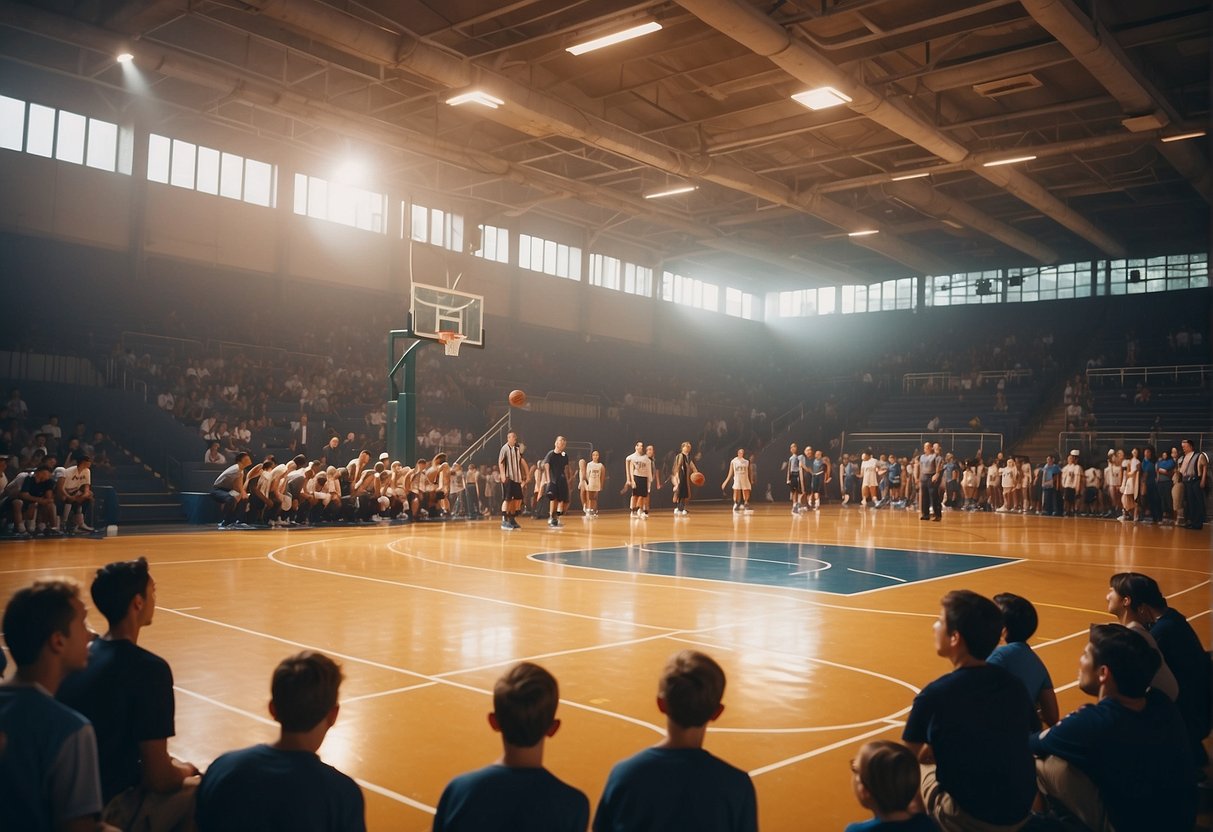Unlock the secrets to climbing the ranks in basketball with my expert strategies. Learn how to get ranked in basketball and elevate your game to new heights.
How to Get Ranked in Basketball?
The Importance of Rankings in Basketball
Basketball rankings are a barometer for a team’s performance relative to other teams. A higher ranking typically signals a successful team, and can lead to not just prestige, but tangible benefits. For instance, teams that are ranked higher often have a psychological advantage before a game even begins. There’s a reason fans and commentators frequently refer to these rankings when discussing favorites and underdogs.
How Rankings Affect Opportunities
When it comes to opportunities, rankings can open doors. For collegiate teams, a high spot in rankings such as the NCAA Evaluation Tool (NET) can influence invitations to high-profile tournaments, seeding positions, and even impact recruitment efforts. Being on a ranked team for high school players can make you more visible to college scouts, increasing your chances of securing a scholarship.
Improving Your Skillset

Mastering Offensive Skills
Shooting is a fundamental basketball skill you need to master. Start with the basics: perfect your shooting form with repetitive drills focusing on your stance, grip, and follow-through. Here’s a table to guide your practice:
| Focus Area | Drills |
|---|---|
| Free Throws | Shoot 100 free throws daily |
| Three-pointers | Around the World: 5 shots from 5 spots |
| Layups | Mikan Drill for better close shots |
Develop your ball handling to elevate your offensive game. Dribbling drills like the figure-eight and cone dribbling will improve your footwork and control. Practice these drills until they become second nature, enhancing your ability to navigate the court under pressure.
Honing Defensive Abilities
Your defensive skills are just as crucial as your offensive prowess. Work on footwork and athleticism to keep up with fast-paced plays and to be effective in man-to-man or zone defense. Incorporate agility ladders and defensive slides into your workout to boost your defensive abilities.
Rebounding is about positioning and timing. Your skills in boxing out and reading the ball’s trajectory are vital. Perform drills that simulate game situations to improve your rebounding techniques, such as the ‘War’ rebounding drill, where you compete against another player for the ball.
Exposure and Recruitment

Connecting with College Coaches
The first step to gain recognition in the collegiate basketball arena is to initiate contact with college coaches. A key strategy is to create and share your highlight videos, an effective tool that allows coaches to assess your skills quickly. How to Get Recruited for College Basketball explains that you can contact coaches directly. If you take the initiative to call a coach, they can engage with you. This can be crucial, especially if you aim for a Division I program or even smaller NAIA schools.
- Establish an online presence with profiles on recruiting platforms.
- Regularly update your profile with new stats and video content.
- Engage with coaches through email and phone calls.
Utilizing Camps and AAU
Camps and AAU are pivotal in your athletic development and recruitment chances. Scouts often frequent these venues, allowing student-athletes to demonstrate their abilities against competitive peers. Attending well-known camps can drastically improve your chances of being seen. Participating in camps and AAU enhances your skills and gives you the exposure needed to be ranked and potentially recruited.
- AAU basketball: Join teams that participate in high-level tournaments.
- Camps: Enroll in summer camps that attract top talent and coaches.
- Networking: Use these events to make connections with peers and scouts.
Building a Strong Personal Brand

Leveraging Social Media Platforms
Social media is your ally in building your brand. Engage with your audience on platforms like Instagram, Twitter, and Facebook with regular updates and behind-the-scenes content.
- Instagram: Use visually compelling photos and stories to highlight your basketball journey and training.
- Twitter: Share your thoughts on games, connect with fans, and participate in basketball-related conversations.
- Facebook: Create a professional athlete page where you can post longer content, such as articles or detailed updates.
Creating a Compelling Highlight Reel
A highlight reel can be a game-changer. Platforms like Hudl make it easier to curate and share your best moments on the court.
- Select Key Plays: Choose clips that showcase various skills, such as scoring, defense, and leadership on the court.
- Tell a Story: Arrange your clips in an order that highlights your progress and peaks the viewer’s interest.
- High-Quality Production: Ensure the video is high-resolution and well-edited to make a professional impression.
- Share: Upload your highlight video to your social media and Hudl profile, and encourage your network to share it.
Academic and Athletic Balance

To excel in basketball and maintain strong academics, you must strategize and prioritize your responsibilities. As a student-athlete, your day is packed with classes, homework, practices, and games: a demanding schedule that requires sharp focus and diligent planning.
Organizing Your Schedule
- Plan: Use a planner or digital calendar to map out your week.
- Class Selection: Choose courses that fit well with your training and game schedule, ensuring you avoid burnout.
Studying Efficiently
- Focused Sessions: Short, intense study periods can be more productive than long hours of unfocused work.
- Travel Time: Utilize time on the road to catch up on reading or review notes.
Communicating with Professors
- Proactive Dialogue: Inform them of your sports schedule early in the term.
- Office Hours: Use this time to clarify concepts missed during travel.
Academic Resources
Take advantage of tutors or study groups specifically designed for athletes, as these can help you stay on track academically.
Physical and Mental Health
- Adequate Sleep: Prioritize rest to improve both cognitive function and athletic performance.
- Stress Management: Engage in relaxation techniques such as deep breathing or meditation to balance the pressures of school and sport.
Strategies for On-Court Performance

To successfully increase your rank in basketball, focus on the specifics of your position and in-game tactics that can enhance your performance during games. Understanding these elements is vital to your progress as a professional athlete.
Understanding Play Positions
Understanding your position on the court is crucial. You need to know your role, whether you’re a guard, forward, or center. Each position has its unique responsibilities; a guard needs to handle the ball and control the pace of play, a forward should be versatile in both offensive and defensive plays, and a center is typically responsible for rebounding and protecting the paint. Always be aware of your positioning and the time left on the clock. This awareness can influence crucial decisions that may dictate the flow of the game or even its outcome.
Adopting In-Game Tactics
To optimize your performance, adopt effective in-game tactics. For instance, using the triple threat position—where you can pass, shoot, or dribble—keeps defenders guessing and gives you multiple offensive options. Additionally, sharpening your defensive skills such as footwork, anticipation, and positioning is just as important—solid defense can transition into efficient offense. It’s also essential to understand perimeter defense and how to guard players beyond the arc, as the three-point shot is a vital part of modern basketball. Keep the pace according to what benefits your team, whether it means slowing down or speeding up the game, to maintain control over the opponent.
FAQ
What does it mean to get ranked in basketball?
Being ranked in basketball typically refers to being recognized and assigned a numerical position within a list of players or teams based on performance, skill level, or potential. Rankings can vary depending on the organization or platform providing them.
What is a 5-star in basketball?
In basketball recruiting, a 5-star rating typically denotes a player with exceptional talent, potential, and skill level. These players are highly sought after by college programs and are considered among the top prospects nationally.
How do you get ranked in prep hoops?
To get ranked in prep hoops, players often need to participate in competitive tournaments, showcases, and camps where their skills can be evaluated by scouts and analysts. Performing well in games, showcasing fundamental skills, athleticism, and basketball IQ are key factors in earning a ranking. Additionally, maintaining a strong academic record and displaying good sportsmanship can also influence rankings by some organizations.
If you enjoyed reading about the topic: How to Get Ranked in Basketball, leave a comment and stay updated on Pinterest for more exciting basketball news.
Leave me a comment and make sure to also check out How to Get Recruited for College Basketball.






